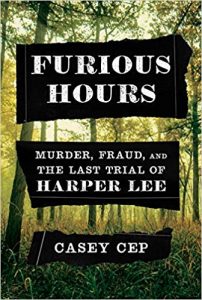 As evidenced by its extended title Furious Hours: Murder, Fraud and the Last Trial of Harper Lee is really three interrelated stories. The first, and impetus for the rest, is the murky tale of a murky man, the Reverend Willie Maxwell, an itinerant preacher and laborer whose immediate family members had the unfortunate habit of dying under mysterious circumstances. Whether the Reverend was unlucky or not depends on your perspective, because it always turned out that said family members were insured to the hilt, with the beneficiary being, unsurprisingly, the Reverend himself. He was found innocent the only time he was tried for his losses, and eventually (no spoiler here, it’s on the jacket copy) shot in church during the funeral of one of his alleged victims.
As evidenced by its extended title Furious Hours: Murder, Fraud and the Last Trial of Harper Lee is really three interrelated stories. The first, and impetus for the rest, is the murky tale of a murky man, the Reverend Willie Maxwell, an itinerant preacher and laborer whose immediate family members had the unfortunate habit of dying under mysterious circumstances. Whether the Reverend was unlucky or not depends on your perspective, because it always turned out that said family members were insured to the hilt, with the beneficiary being, unsurprisingly, the Reverend himself. He was found innocent the only time he was tried for his losses, and eventually (no spoiler here, it’s on the jacket copy) shot in church during the funeral of one of his alleged victims.
The second, more fleshed out narrative is the story of the lawyer, Tom Radney who defended Maxwell at his trial and fought the insurance companies for his payouts. In a somewhat dizzying about face, he then proceeded to defend the man who shot his former client. Radney’s life was much better documented, and Cep is able to present the portrait of a man who both loved his native Alabama and was thoroughly at odds with it, a Kennedy Democrat at a time that such a thing was becoming anathema to the white establishment there. Despite his representation of the evil Reverend, he was a man of honor, one who grew to be respected by those around him despite their differences. Readers will find themselves making comparisons to a fictional character who shares many of Radney’s characteristics, one Atticus Finch.
Indeed he was to become close to Atticus’s creator, the legendary Harper Lee, who came to him for background when she decided to end her post To Kill a Mockingbird funk with a new, intriguing true crime project along the lines of her friend Truman Capote’s In Cold Blood. It was, of course, to be the story of the life and crimes of the Reverend Willie Maxwell. She plunged into the work with more enthusiasm than she’d shown for anything since the dramatic and vertiginous success of Mockingbird. Unfortunately, despite the original momentum and the many sources who came out of the woodwork to tell their stories Lee was unable to shape her material into anything that satisfied her, and the work expired with a whimper. How far along she got and what she actually wrote is as yet unknown due to the continuing blackout by her estate, but I couldn’t help thinking that in the midst of so much rumor and so few facts that it was Lee’s refusal to dilute her nonfiction with fiction that denied her Capote’s success.
I raced through Furious Hours — it’s an intriguing and absorbing read. It wasn’t until I was done that I realized it’s basically a story about unresolved crimes and an unwritten book. But Cep overcomes this with her engaging style and impressive erudition. To flesh things out she presents capsule histories of hydroelectric power in Alabama, voodoo in the New World and many other germane topics. Her portrait of Harper Lee is as vivid as that found in any full length biography. True crime is a very strong category at present and this book is bound to go down as one of the best of the year. (Jamie)